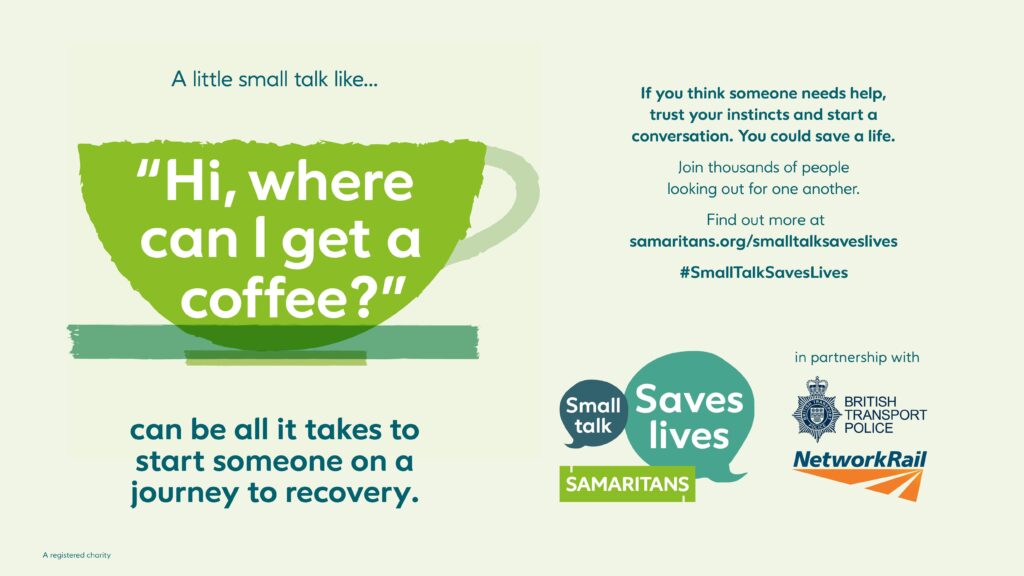We have joined Samaritans, British Transport Police and the wider rail industry to remind the public we all have the potential to be lifesavers by simply striking up a conversation.
It’s part of Samaritans’ latest Small Talk Saves Lives campaign. The campaign comes after research from Samaritans revealed just half of UK adults said they would feel confident approaching and speaking to someone they don’t know if they were concerned about them in public.
The survey also suggested we’re more comfortable behind a screen as a nation. People would much prefer chatting to someone they don’t know on the phone (33%) or by email (18%), compared to face-to-face (9%).
Of those who said they wouldn’t feel confident approaching someone they don’t know, the top reasons holding them back were ‘worrying the person wouldn’t welcome their approach’ (44%) and ‘worrying they’d make things worse’ (29%), whilst a quarter said ‘not knowing what to say’ was also a concern.
So, Samaritans is relaunching Small Talk Saves Lives to empower the public to trust their instincts and start a conversation if they think someone needs help on the railways or in other public settings.

‘Where can I get a coffee?’
As part of the launch, a new film across digital and social media reassures the public that a little small talk like ‘where can I get a coffee?’ can be all it takes to interrupt someone’s suicidal thoughts and help set them on a path to recovery.
Over the coming weeks Samaritans volunteers across the country will be hosting outreach events in stations around the network, speaking to passengers about the importance of small talk and providing myth busting leaflets to help ease any concerns they may have.
Julie Bentley, chief executive of Samaritans, said: “It’s normal to feel anxious about starting a conversation with someone you don’t know in person, but at Samaritans we know first-hand how life-changing that conversation could be. Suicidal thoughts are often temporary and there’s no evidence to suggest that you will make the situation worse – it’s about trusting your instincts, starting a conversation, and showing you care.
“We know it’s been a really challenging time for people’s mental health over the last few years, so we hope the Small Talk Saves Lives campaign builds that confidence and remind the public of the difference they can make. Let’s continue to look out for one another – it could save a life.”
Andrew Haines, chief executive of Network Rail, said: “Everybody who uses the railway, passengers or staff, has the skills to be a life saver. Small Talk Saves Lives is about reminding us all that a little conversation can go a long way to help someone in crisis and divert their thoughts from suicide. I am ever so proud of our relationship with Samaritans and British Transport Police, and hope this next stage of the campaign helps educate more people on how they can potentially save a life.”
British Transport Police ACC Charlie Doyle, national strategic policing lead for suicide prevention, said: “Together with rail staff and members of the public, our officers continue to look out for vulnerable people and save lives. We know from experience that when someone is in distress, engaging them in conversation can make all the difference in that moment. If people don’t feel comfortable or safe to intervene, they can always tell a member of rail staff or a police officer, text British Transport Police on 61016 or call 999.”
For more information and tips, visit Samaritans | Small Talk Saves Lives or join the conversation on social media using #SmallTalkSavesLives




